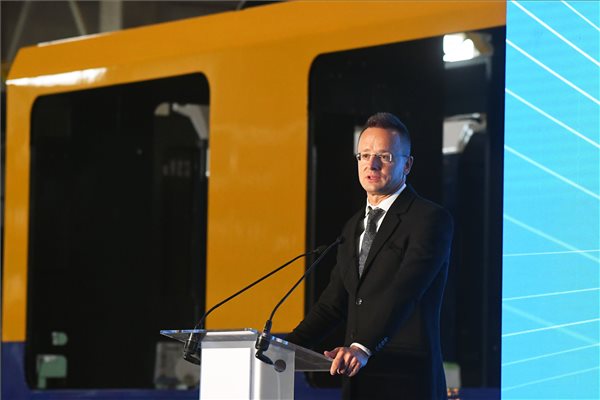One of the most important areas of bilateral economic cooperation with Egypt is the transport industry.Continue reading
Swiss railway vehicle manufacturer Stadler will create more than 170 new jobs in Szolnok (central Hungary) with a HUF 17 billion (EUR 44.1 million) investment, the Minister of Foreign Affairs and Trade Péter Szijjártó announced.
At the press conference of Stadler Szolnok Kft., producing its 5,000th car body in Hungary, the minister said that the investment will increase the company’s production capacity by almost 20 percent, so that it will be able to produce 750 car bodies a year.
The HUF 17 billion (EUR 44.1 million) project will be supported by the state with HUF 4.8 billion (EUR 12.5 million), contributing to the creation of 170 new jobs and bringing the company’s workforce to nearly 1,000.
In his speech, Péter Szijjártó stressed that Stadler had also contributed significantly to the fact that last year, despite all the difficulties, the record for investments, exports, and employment in Hungary was broken.
In Hungary, the company established Stadler Trains Hungary Kft. in 2005, after winning the public procurement procedure for the purchase of 30+30 suburban trains. In October 2007, it was decided that Stadler Trains Hungary Kft. will set up a 400-strong aluminum body plant in Szolnok. The plant started production in the last quarter of 2008.

Minister Péter Szijjártó at the press conference. Photo via MTI/Mészáros János
Szijjártó also pointed out that the company’s export share is around 90 percent, and its trains are not only present in several major European cities, but also in the United States, where metro cars manufactured in Szolnok are used.
He highlighted that in the recent history of Hungarian railways,
90 percent of the passenger trains were manufactured by Stadler, and half of the passengers traveling on Hungarian lines board such trains, especially in suburban traffic.
The minister also spoke about the economic challenges of recent years, the difficulties posed by the COVID epidemic and the war in Ukraine, and the transformation of the world order, with the sudden impossibility of supply chains built up over decades.
“Without investment, there can be no economic growth, and
in recent years investment has been the basis for the Hungarian economy’s ability to remain on a growth path,”
he concluded.
Via MTI, Featured image via Facebook/Szalay Ferenc